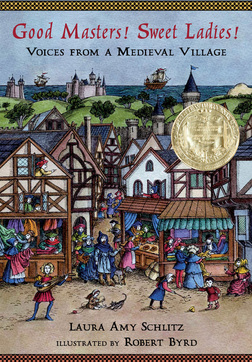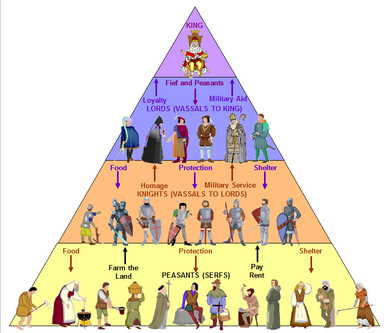Welcome to Class! Greetings fair ladies and gentlemen! So good to see you all at long last! We began with a brief overview of the structure and content of the class. What exactly will we be doing over the next 14 weeks? Students will be engaged in learning across three integrated areas:
The Feudal LifeStudents learned that feudalism became the primary structure of society during the Middle Ages. It was a system that tended to give power to a few in command and limited those beneath them severely.  Feudal Pyramid of Power Feudal Pyramid of Power A basic pyramid type structure illustrates the king at the top, with nobles/lords, knights, and peasants/serfs beneath. We discussed the term vassal (a person in a subservient position to another, granted land or the use of land in return for loyalty and protection) and fief (an estate of land, given on condition of feudal service and loyalty). To illustrate the realities of life in feudal society, we played a simple game. Students were randomly assigned role cards (king, noble, knight, or peasant) and 10 candies each (representing crops from their harvest). We then imagined a typical scenario where each vassal would be required to give a certain portion of their crops to the individual above them - peasant to knight, knight to noble, and noble to king. The distribution of candies at the end of the simulation helped illustrate the inequities of the feudal system. Barbary the Mudslinger Peasant girl Peasant girl We read our first monologue together from Good Masters! Sweet Ladies! (Barbary the Mudslinger) and discussed the theme of the piece (adversity and regret). Students worked in pairs to answer questions about the author's use of language to convey the theme. We did not have time to fully discuss, so please continue to think about these questions at home - and re-read the monologue. Does this seem like a character you'd like to perform? Students should keep in mind that although Good Master! Sweet Ladies! is not a lengthy book, the material it contains is very rich. This is not a book that is meant to be read quickly and put down, but rather read and re-read for deeper meaning and nuance. We will be spending time searching for the themes of each monologue, understanding the authors use of figurative language, and discovering for ourselves the emotion underlying each character - all of which will be necessary to truly bring these medieval personalities alive in our dramatic performances. HomeworkTo prepare for class next week, students should:
Comments are closed.
|
Categories
All
Archives
May 2016
|

 RSS Feed
RSS Feed